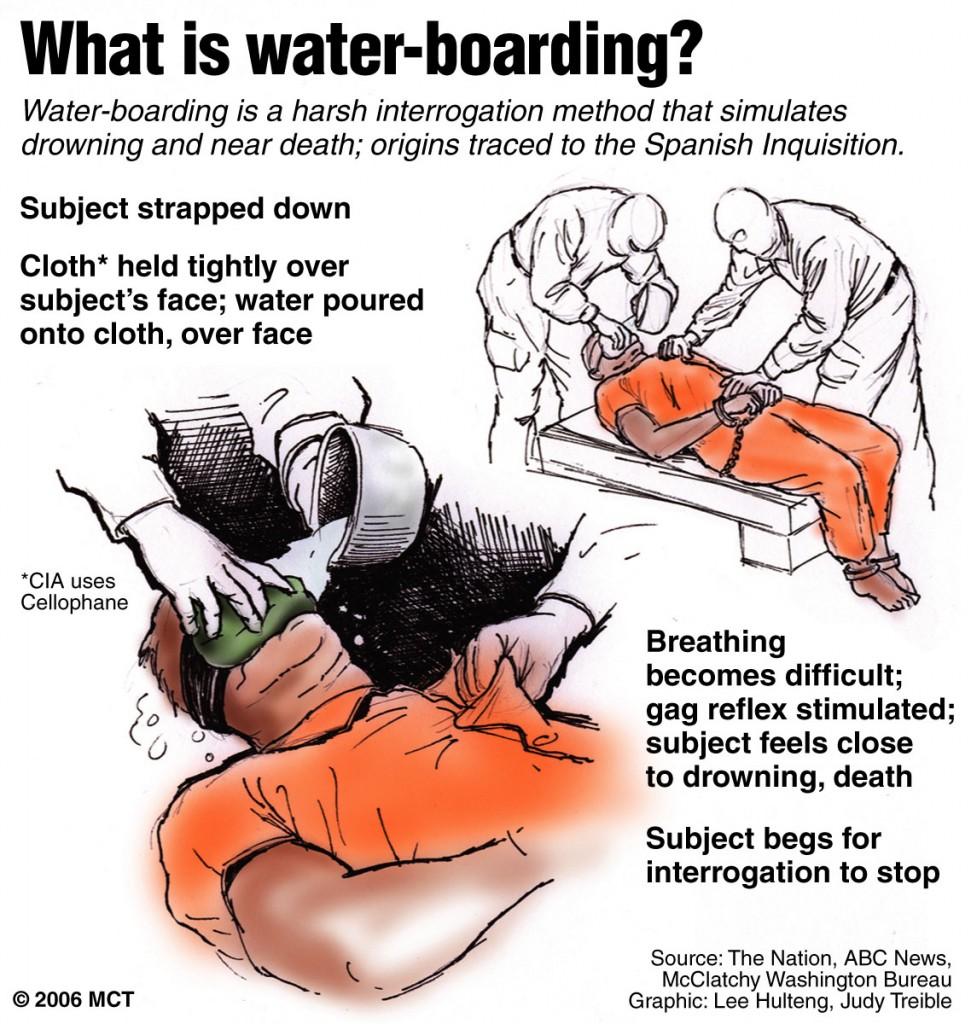Waterboarding is Evil, But Who Decides Which Evil is Necessary?
May 30, 2011
Published: November 15, 2007
Waterboarding is torture. How could it not be? I’m reluctant to acknowledge waterboarding as an “interrogation technique” because I feel that this terminology dignifies the practice in some way.

When I think of different means of interrogation, I think of formal and informal interviews, spoken or written question and answer sessions, conversations had face to face or conversations held over the phone or via the Internet—but it has never crossed my mind to think of an interrogation as consisting of immobilizing a person and pouring water over his or her face. Simulating a person’s death is cruel. It’s torture. It’s illegal. Yet, I’m not convinced we should be the ones to judge whether it should be employed or not.
Whether waterboarding should be considered torture or not, and whether it should be employed by the U.S. when interrogating prisoners of war, has become a heated public debate sparked (or re-sparked) by the answers given by Michael Mukasey during his confirmation hearings before the Senate Judiciary Committee. Although Mukasey’s nomination for attorney general confirmed by the committee on Nov. 6 might have been a much needed measure, I think his indefinite answers about waterboarding as an “interrogation technique” and how much leeway should be allotted to President Bush during this time of war are indeed a cause of discomfort.
It doesn’t make me feel any better to know that the CIA has told CNN that waterboarding is a technique that produced intelligence that has proved invaluable to the U.S.’s attempt to understand the enemy.
Even though it’s unsettling that Mukasey would not take a firm stand against the practice of water boarding, we should all take a moment to reflect on those things he did say. His reason for not taking a stand one way or the other is an intelligent one.
Although he admitted that he thinks the procedure is a “repugnant” one, he claims not to know enough about the procedure to take a stance for or against it. After watching a few YouTube videos about water boarding, I’m starting to think he’s right.
The truth is that we don’t know enough to engage in a public conversation bashing the army, the CIA and (I hate to say it, but …) President Bush. I don’t think I’m contradicting myself. I still think that waterboarding is disgusting, and it should be considered torture, and therefore illegal, but I’m not sure whether the law should apply when we’re talking about our fight against “evil.” I don’t think it’s a question that we, or Michael Mukasey, could answer without hours, days, months, years of study and reflection.
I realized how ridiculous it is for us to pretend we know (or should know) what kind of work the CIA and the U.S. Army is doing after I watched the “water boarding instructions” video on You Tube. The video seeks to make a stand against waterboarding, but what it does instead is demonstrate American stupidity. It defiles the image of our soldiers at a time when these men should be respected and supported the most. (I don’t think I’ll ever understand how Americans can so easily turn against their soldiers without understanding the atrocities they are forced to endure).
I don’t know what kind of human being could be capable of inflicting pain on another. The fact that American intelligence officers may possibly be using this technique to fight on our behalf makes me cringe, but so does the fact that terrorists are killing many Americans without showing any sign of remorse. Do we need to torture terrorists in order to save American lives? Is it a necessary evil? I’m not so sure. I don’t know enough about what constitutes necessary evil. Do you?












MT • Apr 25, 2022 at 8:56 pm
Necessary evil for the common good, though it is may be ‘necessary’, is always an evil and never a good. Remember that.